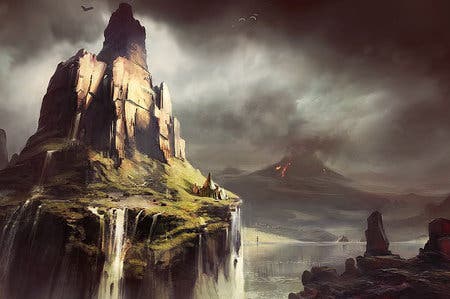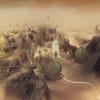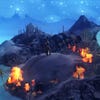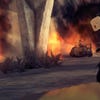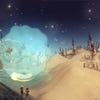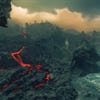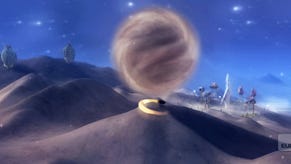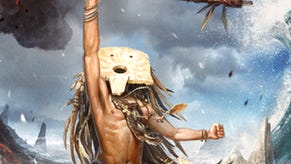Games of 2011: From Dust
Heaven sent.
It's Nottingham, the end of a crisp autumn day, and Eric Chahi's smile is as bright as the late October sun - although his is a face that seems reluctant to ever frown.
His eyes are permanently smiling and a playful grin is always ready to flicker across his features. His hair rinsed a blue that matches the shade of his suede shoes, he's delighting in the reactions of those sampling his own take on molecular gastronomy at this year's GameCity. It's another of Eric's many interests, and in the luminescent desserts and stereoscopic starters there's a combination of playfulness, curiosity and eccentricity that'll be familiar to anyone who's played his games.
When Heart of Darkness finally came out in 1998, six troubled years on from the game that made Chahi's name, it perhaps shouldn't be have come as a surprise that his next game was well over a decade away, that this talent would be lost to videogames for thirteen years.
It helped infuse his return, coming at the end of an Ubisoft E3 conference that until Mr. Caffeine pooped on our toothpaste earlier this year was one of the French company's most bizarre, with a certain mysticism. Sitting in on one of the show's demos, it was a mysticism amplified by Chahi's whispered presentations, roomfuls of people who had been beaten into submission by being drilled in the gameplay pillars of that year's new class of shooters now struggling to understand his gentle, splintered English, and struggling to comprehend this strange new game.
A self-confessed spiritual successor to Populous, From Dust is a god game infused with a spirituality very much its own. While it's still essentially about capturing villages, shepherding villagers and conquering the elements, From Dust's god is a far more playful one than any of its predecessors. Even the Breath, the on-screen pointer through which the player's actions are directed, is a spirited thing, dancing around with all the energy of a dog chasing its own tail.
And what the Breath enables escalates that spirit of play to giddy heights. With this tool at your fingertips, you can lift oceans, dirt and lava in thick, gloopy globes which can then be deposited at your will, painting entire landscapes in the process. It's a digital retelling of a toddler's afternoon at the seaside, where tiny hands sculpt castles, mountains, lakes and eddies out of sand - only here the child is promoted to a benevolent deity, playing with a land at its very genesis.
There's a rhythm, both in the rise and fall of the tides that lap against small shores and in the soft silting of sand as you let it rush down a mountainside, that's soothing. You're playing as an all-powerful god, though From Dust's more likely to transport you back to childhood, marveling at the cool tickle of damp sand running between your fingers.
For a game that's obsessed with play, and one that turns the dawn of creation into one large and very well stocked sandbox, From Dust can still be a demanding and sometimes stressful experience, especially in later levels. Nature's a volatile toy, and in From Dust it's always one step ahead of you, always ready to crush your sandcastles with one cruel tidal wave. It makes for a strangely humbling game, one that empowers you while reminding you of your own fragility at the very same time.
From Dust's theme and its mechanics invite lofty conjecture, yet its genius is how it always returns to the same core concept; it's about play, unadulterated. It's a purity that's rare to see outside of the indie scene - or outside of Nintendo - and in its meshed together with a high concept to make it's the kind of game that only an outsider could create.
The 13-year distance between Chahi and the industry is responsible for a blissful ignorance of the gaming zeitgeist - there's no XP system, no auto-posting to Facebook or Twitter of how many villagers you've saved or mountains you've conjured - that lends it a timeless nature, and makes it feel like a very singular vision.
Chahi spent those 13 years in an exile in which he indulged his curiosities, developing an interest in volcanology that's explicitly transferred to From Dust. It's not the only one that makes itself known in the game.
Playing From Dust is like spending an afternoon lost in conversation with this enthusiastic autodidact, pushing you towards its other influences; Koyaanisqatsi, the paintings of Zdislaw Beksinski or John Conway's Game of Life, the 1970 mathematical model and the archetypal god game.
To credit From Dust entirely to Chahi is to do disservice to the team at Ubisoft Montpeillier that helped bring his vision to life, but even though it's told from a thousand's arm lengths it's a very personal experience. There's the same sense of play, of a hundred profound ideas I'll never fully understand delivered with a smile and of a little eccentricity that you get if you're ever lucky enough to meet Chahi himself.
And it's a game that Chahi seemed to enjoy making as much as we've enjoyed playing it. Now that the industry has broadened to allow for something so esoteric it seems that he's more welcome, less likely to be burnt by an experience such as Heart of Darkness. He's ruled out a sequel to From Dust, but is already at work on a new game, suggesting that he's going to stick around a little longer - and it's absolutely wonderful to have him back.
